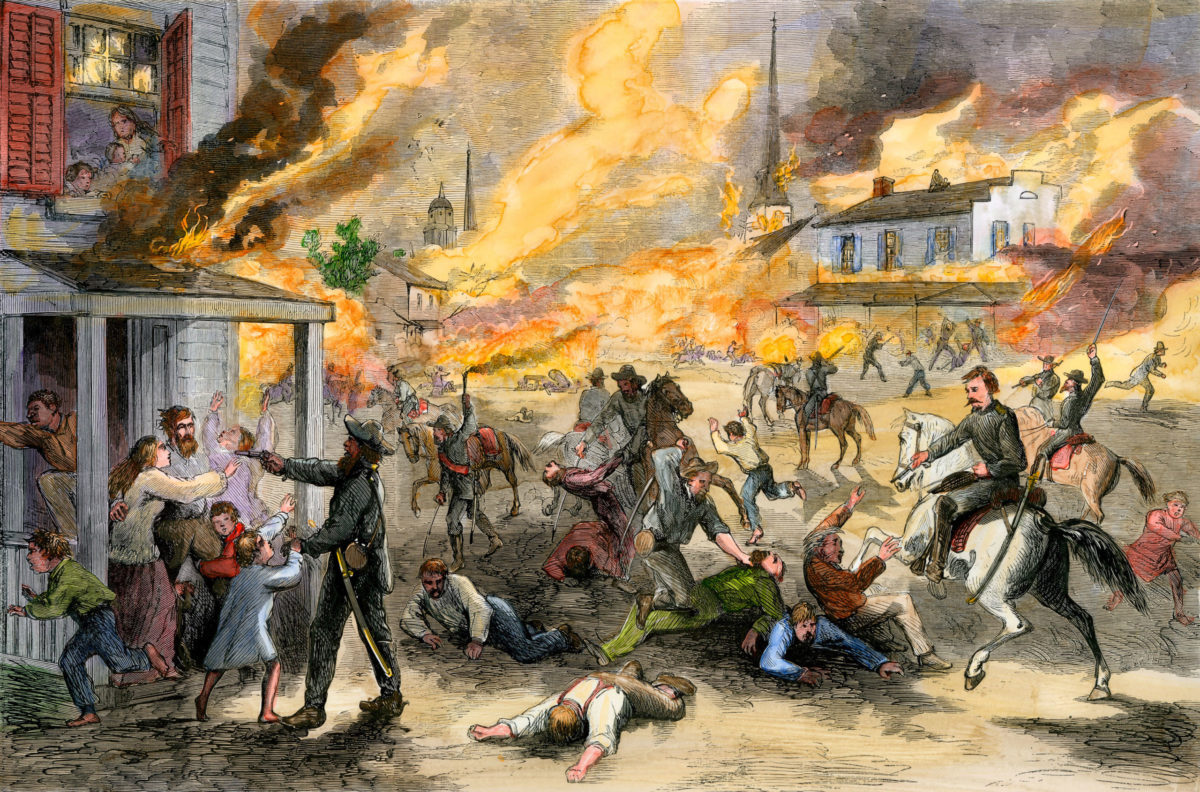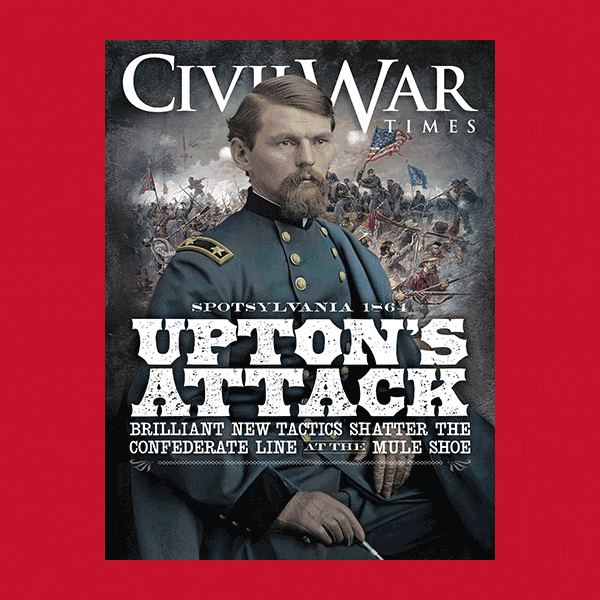For more than a decade, William “Griff” Griffing has been transcribing letters of Civil War soldiers. It’s not just a hobby, but a passion. He has transcribed thousands of letters and diaries, many held in private collections, which he posts on his Facebook page and website “Spared and Shared.” We asked Griff to share with us some of his most favored, memorable, or compelling letters to date. A tough task, he noted, since he has come across so many remarkable accounts.
Here, we include three of nearly a dozen he chose, including a letter from a soldier recounting his experiences at the Battle of Shiloh; a civilian who survived William Quantrill’s grisly raid of Lawrence, Kan., in August 1863; and one from an officer of a USCT regiment recounting the Black troops’ terrifying struggle at the Battle of Brice’s Cross Roads on June 10, 1864. “When ghastly death stares a man in the face, [it] inspires him with such dauntless courage and physical strength as only those who have met it know to power,” he wrote.
Lester Bishop Filley
This remarkable letter was written by Lester Bishop Filley. On March 22, 1862, at age 33, Filley enlisted in Company D, 61st Illinois Infantry. In this letter, Lester informs his wife of the death of her brother, Marshall Smith Corey, who served with him and was killed during the Battle of Shiloh.
According to accounts from the first day at Shiloh, 400 men of the 61st Illinois Infantry were formed in line in time to receive the first assault of the enemy and they stood their ground for more than an hour. They were then ordered to support a battery of the 1st Missouri Artillery, and at 1 p.m. were ordered to the support of Maj. Gen. Stephen Hurlbut—coming to his support at a critical moment, and maintaining his line until relieved by a fresh regiment, their ammunition being entirely exhausted.
[Note: This letter is from the private collection of Richard Weiner and is published with his express consent.]
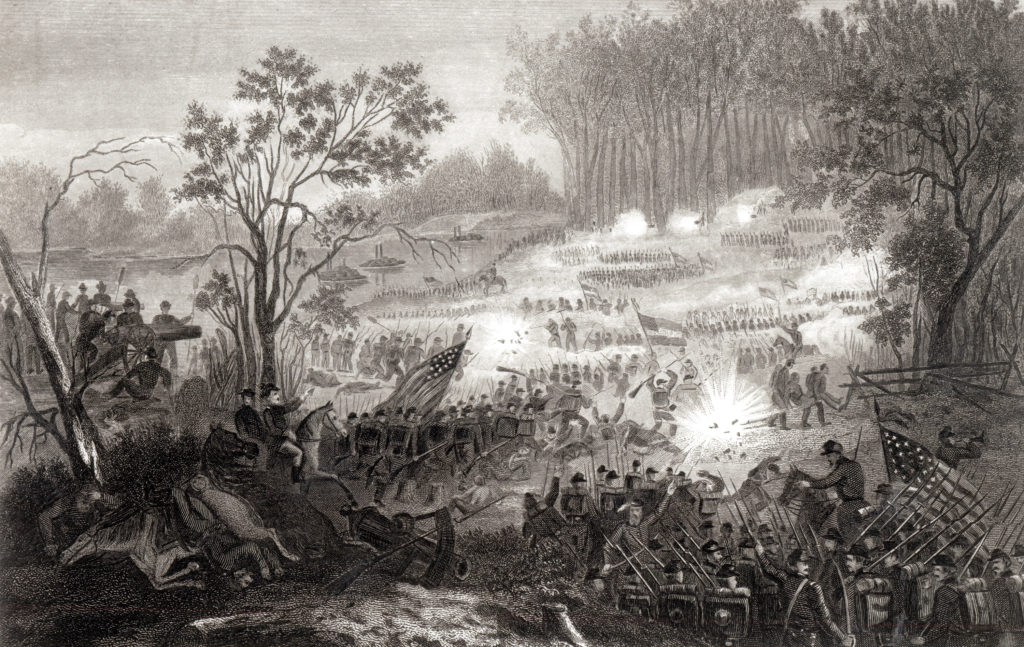
Pittsburg, Tennessee
Thursday night, April 10, 1862
My Dear wife,
I have just received yours of April 1st—the first one I have had since I left St. Louis. I have passed 4 as hard days as ever I saw. You have, I suppose, ere this seen an account of the terrible battle fought at this place last Sunday, Monday, & Tuesday. It was the worst fighting I ever saw. Thousands of lives lost and among them our brother Marshall [Smith Corey of Co. E]. He fell after having fought from six A.M. till about 2 P.M. Sunday. He was shot in his left side above the hip bone. I did not see him [but] Robt. Wilder and others saw him. He fought like a hero all day. He threw down his gun, unbuckled his belt, threw off his cartridge box, & fell face down. I did not hear of it till that eve. I could not get to him till Tuesday. I then dug a grave, wrapped him in blankets, and buried him….It was an awful sad time for me. I cut off a lock of his hair and will send it in this letter.
We expect hourly another big battle here. They are not yet satisfied. The Secesh took everything we had. They smashed my trunk. I found my broom, hair brush, and today I found your bible out in the woods wet and ruined. I tell you, it is a sad sight here. The field for five miles square is covered with dead. The camps, boats, & everything convenient is filled with the wounded & dying. We have not begun to get the dead buried yet. I am completely worn out. I have not had a night’s sleep this week. Three nights I was out in the rain. I have had nothing but raw ham & hard crackers to eat. I have seen enough of war. If it was in my power, I would leave for home tomorrow on foot. If I live to see you there again, I shall be a happy man. I never shall enlist again.
Tell Cora I promised to write her this time but I felt too bad to write her such a letter as I wanted to. Kiss her & Dora for me. How bad they will feel to hear of poor Mack’s death. I must quit for tonight. Will write more in the morn if I can.
Friday Morn—3 o’clock A.M.—Our pickets have been driven again and the army are drawn up in line of battle. It is raining hard. Our poor soldiers are having a hard time. I do not have to go into battle but I believe it is worse to see the outside horrors.
We have just heard that Island No. 10 was taken. If we beat them again here or at Corinth, they will, I think, give up. Wm. Vedder would give anything if he was out of this [place] but no one can leave. We have to stay and take it.
Now my dear, I have thus written you a hasty letter in pencil as our ink was destroyed by Secesh. My mind is in no condition to write. I don’t know as I could say anything more in regard to Marshall’s death. It was as sad a blow to me as any ever I had. He was the only one here I could go to with my little troubles. We met often after we got here. He was very healthy. It is strange that he should be the one selected but such is life. It is strange to me how anyone escaped. Ball, shell, & bullets fell as thick as hail. I can’t realize. It all seems like a dream or ledger story. Should we go into another battle here, I don’t expect to come out as sound as I did this time for my turn must come with the rest.
Now wife, keep up good cheer. Think and pray often for me. I will do my best to come out safe and hurry back to see you. You don’t speak of getting the letters I wrote on the boat coming here. Give my regards to all. Kiss the babies for me. Accept & receive a big one for yourself and much love.
(Kiss) Goodbye, —Lester
Mathew Shaw
A civilian named Mathew Shaw, a carpenter in Lawrence, Kan., penned this stunning letter at the time of William Quantrill’s August 21, 1863, raid. Having survived it, he wrote his friend back East of the horrors he witnessed. After the raid, Shaw’s carpentry shop made dozens of coffins for the dead citizens.
[Note: This letter is from the private collection of Rob Morgan and is published with his express consent.]
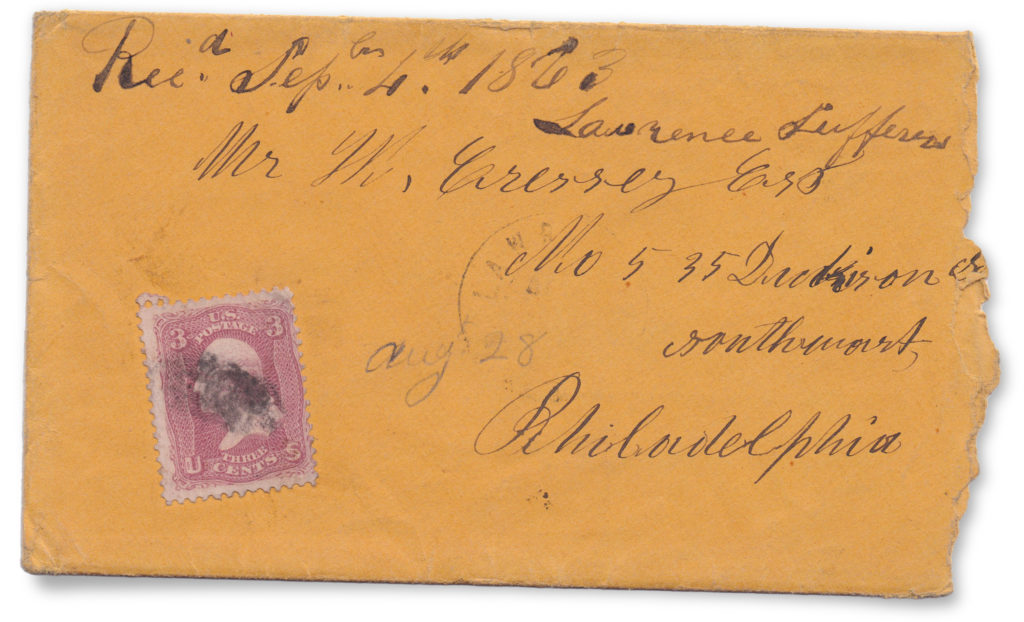
Lawrence
August 28 [1863]
Friend Cressey,
I am still alive, I believe, but it did not seem possible on the morning of the 21[st] that I would escape. Friend Cressey, I am not able to tell you of the horrors—it is beyond description. The scene was more than I could endure. My intimate friends laying in all directions [just] as they was shot down by the villains. A large number was shot near where the houses were burning and were partially burnt, some with their legs burnt off, some with their heads off, and arms burned off. Others all burned up. The bones of a man was dug from the ruins yesterday.
I will tell you as near as I can the whole thing. On the morning of the 21[st] about sunrise before many people had got up, the villains made a charge on the city and in a moment they were all over the town. I being a little remote, they did not get where I was until I had run out with two others to meet them. But we had not got far when we saw that they were well-mounted and armed and were shooting down apparently all my neighbors. We started back to the house followed by the fiends and one of the other two was shot.
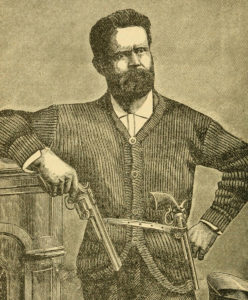
I stood inside my yard waiting to get a chance to shoot. I was partially hid by the peach trees that grew from the seed you gave me. The chance came—I took good aim—and all I could do was to snap a cap at them. My musket would not shoot. Oh! but I felt my time had come. Then I throwed the gun [down] and ran into my house. By this time buildings were burning all over town. During this time the other man that was with me had been firing at them, and ran in the house. Then about 12 surrounded my house and demanded us out and threatened to kill us all and burn the house, and dismounted to make a charge on the house. I then ran out of my house and they after me, shooting all the time, but I escaped and I can hardly tell how.
Friend Cressey, I was not the only one that had a narrow escape. There is hardly a man but what had some encounter. They would go up to a house and call men out, promising not to hurt them, and make them hand over their money and shoot them down. They shot one old man that was feeding them. When they had enough [to eat,] they shot him right down dead. They shot others in the arms of their wives. Killed in all 130, wounded 15 and quite a number missing—probably in the ruins. You probably have a list of the killed and can guess whether there will be a retaliation or not. I say damn them. Give them no quarters…
I was going to say if you choose to help us here that the best thing for us now would be to send us something to shoot with. I will admit we have lost most all of our property, but we have a way of getting that back again—if we had anything but old muskets that won’t shoot. I will guarantee you that if you will send me something to shoot with, I will shoot.
I don’t know that I need say anything more. I will send a paper with this and send you more [later]. You wrote me to send you the State Journal. I am sorry to say that all of our printing houses are burned out. [Josiah] Trask—the editor of the [Lawrence Kansas State] Journal—was killed. He was an Odd Fellow and a better citizen we did not have in this town. I tell you, Cressey, we have something to mourn for here. There was four shot from the house that he was in….I must stop writing about it. I can’t. I tremble to think of it.
We are all well. Your affectionate friend, —M. Shaw
John M. Magner
Captain John M. Magner of the 55th United States Colored Troops (USCT) wrote this letter to his sister praising his soldiers. Magner resided in Edgar County, Ill., when he was mustered in October 1861 as a private into the 66th Illinois Volunteers. In May 1863, he was discharged as a corporal to accept a commission as 1st Lieutenant of Company A, 55th USCT. He was later promoted to captain. The 55th USCT was organized from the 1st Alabama Infantry (African Descent) in March 1864 and fought with distinction at the Battle of Brice’s Cross Roads. It was transferred to Louisiana in February 1865 and served there until mustered out on December 31.
The Battle of Brice’s Cross Roads took place on June 10, 1864, and involved a wholesale rout of Union troops, who were vastly outnumbered by Confederate forces—in particular General Nathan Bedford Forrest’s cavalry. Union losses were 2,600, as compared with less than 500 Confederate losses. The 55th and 59th USCT served as a rear guard to Union forces under General Samuel Sturgis and bravely prevented Forrest from completely demolishing their routed White colleagues as Sturgis withdrew toward Memphis. In this letter, Captain Magner describes the battle and subsequent retreat of Union forces, detailing the desperation of his colored troops.
[Note: This letter is from the private collection of Richard Weiner and is published with his express consent.]
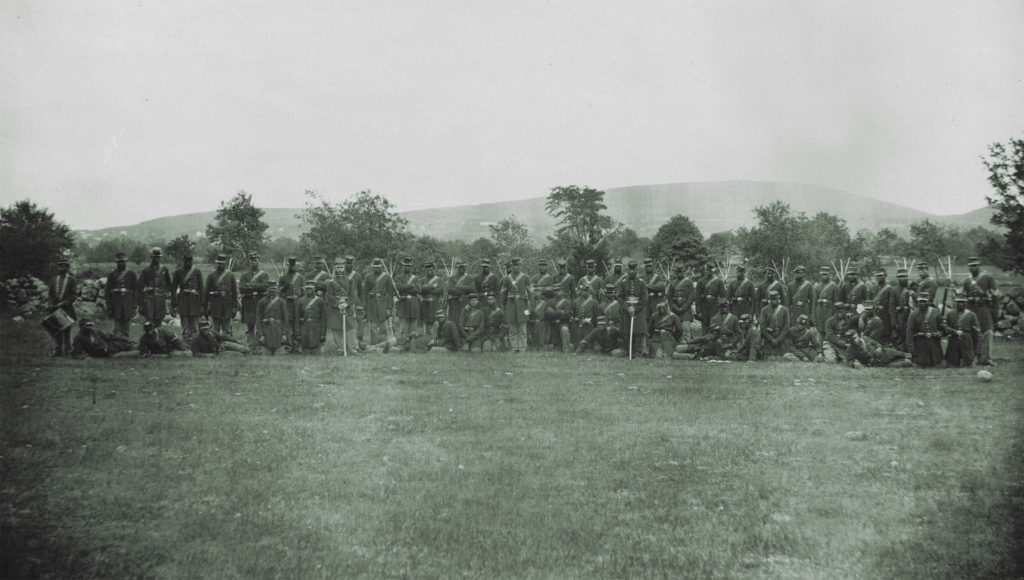
Memphis, Tennessee
July 5th 1864
Sister Nellie,
Your dear good and interesting letter of June 26th was duly received. I will not grumble at a little delay hereafter if you will write such good letters. My health has been improving slowly, but I do not feel well and healthy as formerly. I am doing regular duty with the other officers and I hope I will soon be “Richard himself again.”
You wanted me to tell you in my next letter all about my escape from Forrest, etc. Nellie, would I could tell you all, but to tell all the hardships, the sufferings, and hair-breadth escapes I have had would, I think, make more than you would want to read at one time. Anyhow more than I care about writing in one letter. We had been marching 8 days through the hot sun…on the 9th day we heard cannonading some ten miles before us. My regiment was scattered and divided out—3 men to each wagon and the train being scattered over some three miles of the road. We was some 3 or 4 miles behind the main infantry force. Our cavalry was over 12 miles in the advance. It was the cavalry with some light artillery that had [met] the enemy in force, and was engaging their attention with compliments of balls and shells.
I had been sick with the diarrhea for several days and for the last 24 hours had been riding in the ambulance. Almost as soon as the firing commenced in front we was ordered to ‘double quick.’ I got out of the ambulance and run to the head of my company and took command. I did not think when I did so I would be able to go 2 miles, but I kept at the head of my company 6 miles and on the double quick all the time. I can not now tell how I did it. Other men that was constitutionally stronger fell in their tracks as if dead. I think as much as a third of the infantry force fell out on the roadside before we got into action, and when we did get up, we was so exhausted and so thirsty we was almost crazy. I believe as much as I believe in my own existence I would have given half my life for one good cool drink of water. Oh, you cannot imagine the unendurable pain thirst creates. I seen men as we was leaving the field—the poor fellows—some from exhaustion, others from wounds, to fall in the hands of the enemy would beg to us to stop and get them water then as it was impossible to get water. They would throw up their hands and cry in the most bitter agony and beg us to shoot them to put them out of their misery. We was led into the fight as worn out, over-heated, and almost dying of thirst, by regiment, company, and even platoons, that it was short work to overpower us.
I am satisfied Gen. Sturgis is a Rebel as much as Lee or Davis, and that he had an understanding with Forrest and I have no doubt but was well paid by Forrest through the citizens of Memphis. There is not a colored man in my regiment but could have handled the men better than was done by Sturgis and if I had been in command and wanted my command all “gobbled” up, I would have put them in just as was done. Forrest could have whipped the whole U. S. Army after the strategy of Sturgis.
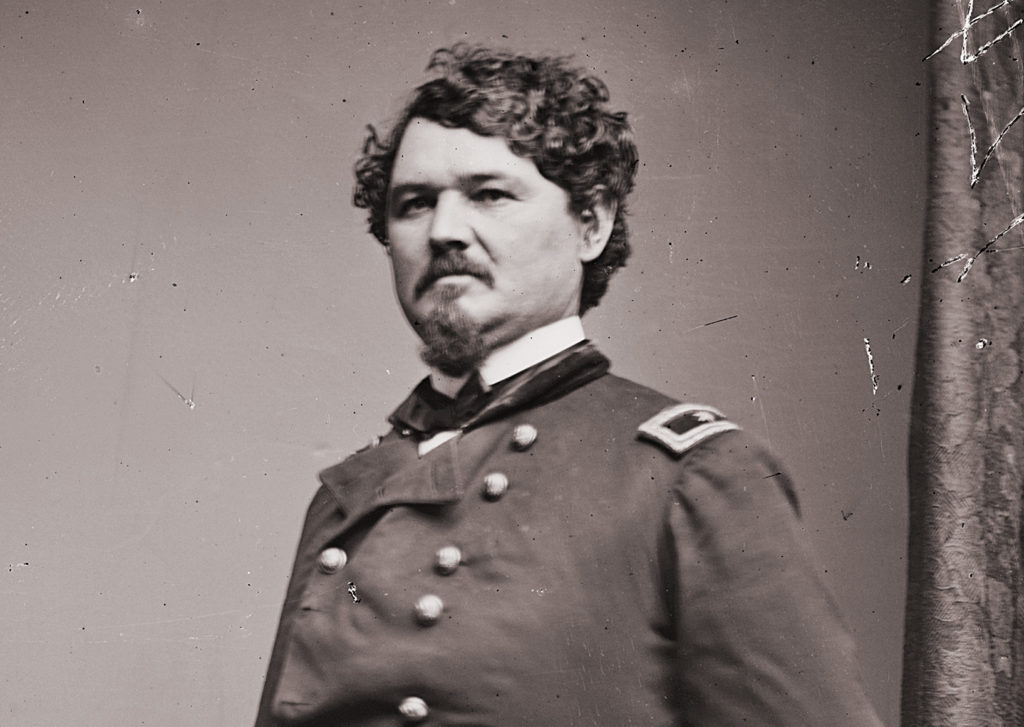
My regiment and another colored regiment [the 59th USCT] fought them an hour after all the white soldiers had become panic stricken and left, but our two regiments could not whip 15,000 men—and almost surrounded too—so we commenced the retreat and now I do not know what to write further. The scenes from the battleground to Memphis beggars all description. I don’t believe Nellie if I was to write all I suffered and endured just as it was, you would hardly give it credit. When we commenced retreating, the rebels outnumbered us 8 to 1 and had us almost surrounded. We was now cut off from all possible succor or support from our white troops—the enemy pouring grape, canister and lead into our ranks at a terrible rate. To me it looked like we could not march 2 miles.
Now imagine the situation—to surrender, if we had been white troops, would have been the best we could have done. But to surrender now was only “death” and when ghastly death stares a man in the face, [it] inspires him with such dauntless courage and physical strength as only those who have met it know to power. We was 25 miles from Ripley and 125 from Memphis. We supposed the white soldiers who had started on before us would go to Ripley and stop, rally and give Forrest another fight, if they did not before, so we cut our way through and commenced as rapid a retreat as possible—the graybacks (Rebels) as close to us that if we looked back, we could almost see the white of their eyes.
We marched about 3 miles when I fell down on the road helpless (but here, as it seemed to me, Providence or some kind fate saved me, as the same good luck saved me in twenty other instances in which I had given up all hopes of getting back). One of our wagons was standing here—all the mules was cut loose from it but one. Two of the boys cut it out of its braces, put me on it, and by almost super human power I managed to ride that mule to Ripley…
I was now at the head of the regiment. I got off the mule and sit down on a log thinking to rest until the regiment and the scattering stragglers passed, and by that time I thought I would be able to mount, and ride on to Ripley. But I had hardly touched the log before I was asleep and just about as the last man of our force was passing, a soldier seeing I was asleep wakened me up. When I saw my situation, I commenced to draw my mule to me, but to my utter astonishment and mortification, some one had come and cut the rein (which was fastened around my wrist) and had rode the mule off, leaving me to hold the [empty] strap. Here I was, our forces almost in Ripley, back with two or three stragglers who was almost as near gone up as I was. But it was no time to think of or spend in foolish regrets. I could distinctly hear the Rebels coming up behind us. I knew if I could make one more mile, I would (as I thought) be safe, so I started as brisk as possible—every step seemed the last—but finally reached Ripley….
But [at Ripley] I did not find any of our forces except the two pieces of colored regiments and a few sick and wounded who had given up and could go no further. We had hardly got in town before the Rebs were coming on us from two directions—from the east and north. We fought them (or our two regiments did—I laid down and looked on) about 2 hours, driving the Rebels out of the town. But as they were being reinforced, it was useless for our small squad to stay longer. A retreat was the only way to save ourselves. Surgeon [Wesley] Humphrey got me another mule here and got me on it and I succeeded in sticking to it until I got within about 8 miles of Lagrange, Tenn. This was about 1 o’clock A. M. and very dark. We was crossing a big swamp—I had been taking opium pills and all the day before and that night I would every few minutes get to napping and fall off my mule. I had no saddle and had to ride ‘woman fashion’ most of the time and I know I fell off 15 or 20 times. Well, when we got to this swamp, I tried the old project of sitting down on a log, tied the halter strap around my wrist so the mule could not get away and thought I would rest while they was fixing up a bridge to cross over. I went sound to sleep and I suppose I slept two hours.
[When I] awaked, everything around me was still as death. I realized in a minute my situation and knew my only hope was to over take our forces which had probably got 8 or 10 miles in advance. I commenced pulling the strap for my mule to come up when, lo again—picture my thoughts when I found the very same trick had been played on me as the other side of Ripley. I was in the same predicament. I started to find the road determined to follow [it] as long as I could a live, but I had no idea at all where the road was and if I found it, was just as apt to go to Forrest as from him. But a few steps brought me into the road.
“Halt! who comes there?” Two men stood before me demanding who I was. I could not tell certain but I almost knew it was Rebs and I knew I must deceive them if I got away, so as quick as thoughts, I answered to the challenge “a friend,” and, said I, “Boys, what regiment do you belong to?” But they did not seem to want me to find out whether they was Rebs or Federals. They answered, “The 10th,” not giving the state. Then asking me what regiment I belonged to, I answered in this way, “I belong to the 10th. I am lost. Where is the regiment? They said it was not far off and would soon be up and one of them began to come up close to me. I saw what he was at—he wanted to find out by sight of my uniform who I was—so another thought struck me, so I said, “My horse is right out here. I will bring him up,” and started out as if I was after him. But by the time I was 20 feet from them, I made tracks through that swamp pretty fast owing to the circumstances against me. They halted me a number of times but I wouldn’t halt.
I run about 75 yds, not knowing which way I was going when I run against a horse standing at the side of the road eating weeds & grass. He had a full rig on him but was covered with mud which I found out when I got on him. I think he had fell off the bridge and the rider was lost. Anyhow, running against that animal not only saved my life but was the happiest moment of my existence. I bounced up on him and turned him in the direction I supposed our forces had went. It was but a few minutes until daylight when I soon overtook a squad of rear guard and afterward our scattered forces. I do not know to this minute whether the two men that halted me were feds or enemies, but I am pretty certain they were rebs.
Well, Nellie, I have news to write not of the war. I am a father. Addie gave birth to a fine boy as they say—June 10th. It was the same day of the fight at Guntown. They are both doing well.
Nellie, excuse haste. Write soon. Love to all and kiss the children
Ever yours, —J.M. Magner
More memorable letters: Read a bonus selection of letters here, or visit Spared and Shared at sparedandshared.wordpress.com.

